The first patient to be diagnosed with Ebola outside Africa told medical staff that he had recently travelled from west Africa, but was not admitted to hospital until he returned two days later, health officials in Texas said on Wednesday.
Thomas Eric Duncan told a nurse at a Dallas emergency room that he had recently visited Liberia, which has been ravaged by the Ebola outbreak. But an executive at Texas Health Presbyterian hospital told a news conference that the information was not widely enough shared with the medical team treating Duncan, and he was diagnosed as suffering from a “low-grade common viral disease”.
Duncan’s sister, Mai Wureh, told the Associated Press that he first visited the emergency room on Friday, but was sent home with a course of antibiotics – an outcome that hospital chiefs described as a matter of “regret”.
Duncan was admitted to hospital when he returned two days later. He was described as being in a serious but stable condition on Wednesday.
Officials said they are monitoring 12 to 18 people who may have come into contact with Duncan, including five school-age children and three members of the Dallas-Forth Worth ambulance crew that transported him to the hospital. The crew members tested negative for the disease but have been sent home as a precaution, city officials confirmed on Wednesday.
Speaking in the parking lot of the apartment complex where Duncan was staying, Mesud Osmanovic, a 21-year-old manual labourer who lives there, said he saw the ambulance arrive.
“When the ambulance came his whole family were all screaming, he got outside and he was throwing up all over the place … when he was throwing up he was trying to walk and he couldn’t walk,” Osmanovic said. He said he had met Duncan only a couple of times but knew him as kind and helpful to residents. “I know him through his family … This ain’t his first time coming to America,” he said. “He was a quiet guy, a really nice guy.”
Apparently to stop media from entering, the main way in to the complex was blocked by armed private security guards who said they had been hired at the request of the owners. The complex is located in Dallas’ Vickery Meadows district less than a mile from the hospital where Duncan is a patient.
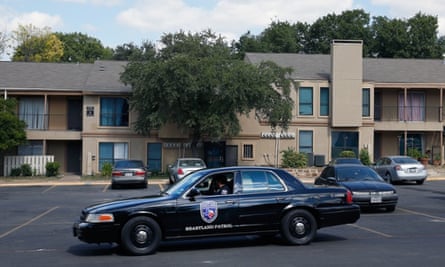
Ebola has so far killed more than 3,000 people in west Africa since the outbreak began in March, according to the World Health Organisation. Duncan travelled from Liberia to Texas on 19 September but did not begin to show symptoms of the disease until a few days after he arrived in the US.
Only patients who are sick with or have died from Ebola can transmit the disease, and it can only be spread through direct contact with blood or bodily fluids. Duncan began developing symptoms, which can include high fever, vomiting and diarrhoea, on 24 September, and visited the Texas Health Presbyterian hospital two days later.
Mark Lester, a senior executive at Texas Health Resources, which operates the hospital where Duncan is being treated, said medical staff used an Ebola checklist, which included a question about travel history. “That checklist was utilised by the nurse who did ask that question,” Lester said.
The nurse was part of a “complex care team” in the emergency department, Lester said, adding: “Regretfully, that information was not fully communicated throughout the full team. As a result the full import of that question was not factored in to the clinical decision-making.”
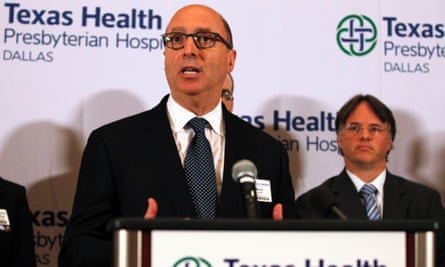
That failure led staff to conclude that Duncan’s symptoms were “not yet typical” for Ebola and concluded that he was suffering from a “low-grade common viral disease”.
The Centers for Disease Control and Prevention (CDC), the federal public health agency, recommends healthcare facilities treat all patients showing symptoms of Ebola, who have recently been to an affected west African country, as “potential cases and obtain additional history”.
The New York Times reported on Wednesday that Duncan had come into contact with people suffering from Ebola in Liberia, four days before he travelled to the US. He helped a pregnant woman in Monrovia, who was showing signs of the disease, to get to hospital when an ambulance was not available.
David Lakey, commissioner of the Texas department of state health services, attempted to allay public concern. “This is not west Africa. This is a very sophisticated city, a very sophisticated hospital and the dynamics are so significantly different than they are in west Africa that the chances of it being spread very, very, very small.”
Later on Wednesday a spokeswoman for United Airlines said the carrier believed it flew Duncan from Brussels to Dallas-Fort Worth via Washington on 20 September, based on information provided to the airline by federal officials. The CDC said there was “zero risk of transmission” on these two flights because the patient showed no symptoms at the time and therefore could not have been contagious, the spokeswoman added.
There was little panic among commuters at a bus stop across the street from the hospital. Billy Herman, 62, said that he was worried “to some degree, yes, but I have confidence in the CDC, that they have a standard process in place, [and] that they’re doing a traceback to see who he’s come in contact with.
“I am confident in the healthcare system in America and that if other individuals are infected, if they start having symptoms that we can control it and it won’t be mass death, fear and destruction like in those third world countries,” he said, adding that he would move away if sat close to someone with flu-like symptoms.
The CDC has sent a nine-member team to Texas to assist local and state officials. “If anyone develops fever, we’ll immediately isolate them to stop the chain of transmission,” said Tom Frieden, director of the CDC.
Duncan will continue receiving treatment at Texas Health Presbyterian hospital of Dallas, even though it is not one of the four hospitals in the US equipped with biomedical isolation unit. Frieden said at the press conference that any hospital is capable of providing the proper care and control needed to treat and contain Ebola-stricken patients. The hospital has designated an entire ward for Duncan.
Meanwhile, a US doctor who was exposed to Ebola in Sierra Leone is under observation at the National Institutes of Health (NIH) clinical centre in Bethesda, Maryland. He was transferred from overseas and admitted to the centre on Sunday, where he was placed in a special unit designed to provide high-level isolation capabilities and is staffed by infectious diseases and critical care specialists, according to the NIH.
The doctor was working for an aid organisation in an Ebola treatment unit in Sierra Leone.
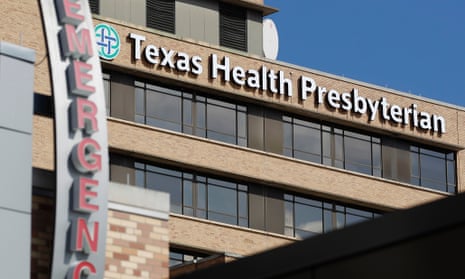
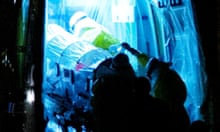
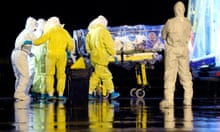
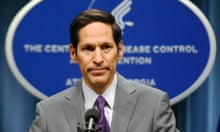
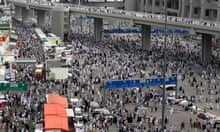
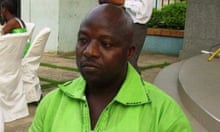
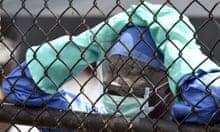
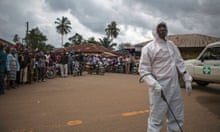
Comments (…)
Sign in or create your Guardian account to join the discussion